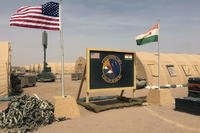The Pentagon says it will start up its missile defense system early -- in the summer, rather than in the fall, as previously scheduled. But the Defense Department's testing chief thinks the program may be going too far, too fast.
"The accelerated schedule, if realized, would enable President Bush to claim fulfillment of a major 2000 campaign pledge earlier than officials had indicated," the Washington Post notes.
Disclosing the planned summer start, Pentagon officials insisted in interviews that politics played no part in revising the schedule. They said the change grew out of the realization that the system could begin providing some anti-missile protection before all 10 of the interceptors slated for fielding this year had been lowered into silos in Alaska and California...
Whether the Bush administration is moving too fast to deploy the anti-missile system was in dispute even before the latest shift, with the Pentagon's own top weapons evaluator recently raising a warning flag. In a status report last month on major new weapons programs, Thomas P. Christie, director of the Pentagon's office of Operational Test and Evaluation, said a shortage of testing data would likely make it difficult for him to assess the system's effectiveness ahead of any deployment this year.
He expressed concern about the small number and relatively simple nature of flight tests, noting they have used the same course each time and have relied on surrogates and prototypes for key elements still under development. Problems with a new booster, designed to carry the interceptor vehicle into space, prompted the Pentagon to suspend flight intercept attempts after the last test in December 2002.
The next flight tests are scheduled for May and July; thus, the Pentagon could end up activating the anti-missile system before results of the summer tests have been fully assessed. (emphasis mine)
THERE'S MORE: The anti-missile system "may not be perfected, or even in what one might consider a production configuration," writes Defense Tech reader JA. "But having *something* in the silos complicates the problem greatly for North Korea, perhaps to the point of making it too expensive to even attempt to develop hardware."
AND MORE: "I don't see how it complicates anything for North Korea," reader MB responds. "They know as well as the rest of us that the chances are near nil of the system being able to intercept even the most rudimentary ICBM."
AND MORE: "That would be true if the leadership of the DPRK believes everything they read about the failures of the BMD (Ballisitc Missile Defense)," retorts reader Wyatt Earp. "The fact is the leadership of the DPRK is an extra kind of paranoid, so the acceleration of BMD is going to have the possibility of pushing the DPRK into two possible directions: Give up on their ICBMs because they aren't going to accomplish anything in light of the American BMD, whose failure is a sinister cover-up by those crafty Imperialists. Or fly the birds either on more test flights or on a strike to knockout the BMD site in Alaska sooner rather than later, thus not being as effective as they could be since they've not finished their missiles either."








